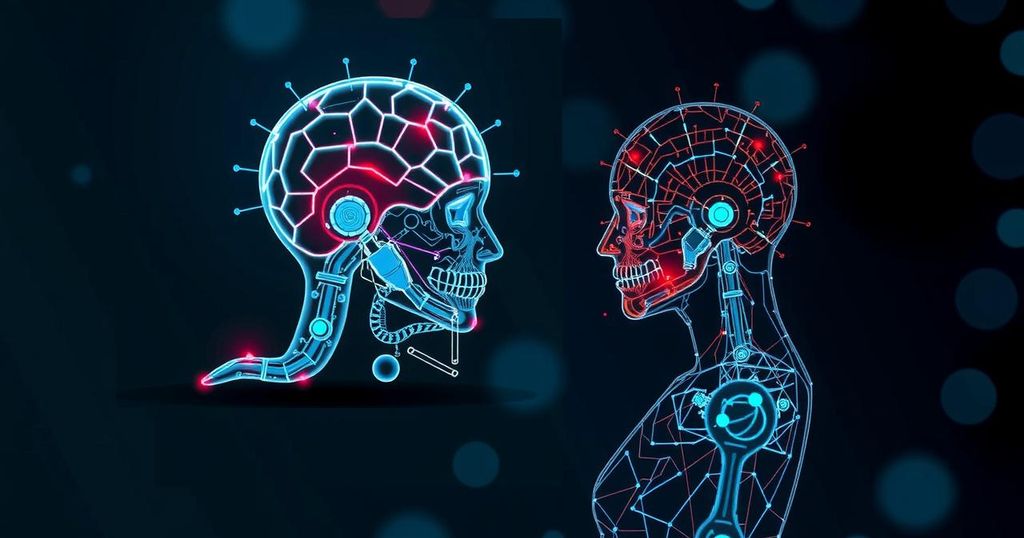The Mirage of Progress: Rethinking AI’s Role in Our Future
In 2024, the impact of AI has shifted from hopeful innovation to critical scrutiny, exposing exploitation and ethical concerns. Once hailed as productivity boosters, many AI solutions fail to deliver meaningful results while raising alarms about sustainability and socio-political influence. Figures like Musk and Altman embody a troubling technocratic future tied to controversial ideologies, prompting reflections on the true essence of technological progress amid the absurdity of AI outputs.
The technological landscape of 2024 arrived like a thunderstorm, swift and overwhelming, shaped mainly by artificial intelligence’s relentless incursion. From the pandemic-driven acceleration into online commerce and social interactions in 2020, a once-enthusiastic embrace of digital life has soured into disillusionment. The once-celebrated promise of generative AI, with its flashy algorithms and efficiency boasts, now seems an underwhelming show; software that promises brilliance yet delivers little more than mediocrity. Amid the early buzz of AI’s potential, which captivated management teams with visions of increased productivity and reduced costs, a harsh reality has emerged—it’s often just a pile of algorithms producing trivial outputs that feed engagement without substance.
This year, the pretense of technological advancement pushed by vast corporations teeters on the brink of dissolution. Once barreling forward as a symbol of progress, AI reveals a troubling truth: it thrives on exploitation, from its reliance on underpaid workers to the unsustainable demand for fossil fuels and rare earth minerals. Despite the fervor surrounding tools like ChatGPT and AI wearables, skepticism looms large, and even the most fervent advocates are growing wary. Analysts signal that the initial excitement around generative AI is fading; what seems like a tech revolution is slowly revealing itself as a half-hearted effort punctuated by far-fetched promises.
As tech giants clamor to dominate the societal landscape, their ideologies, often colored by elitism and disregard for ethical implications, bubble to the surface. Figures like Elon Musk and Sam Altman seem to embody the essence of a new technocratic order, where the push for Artificial General Intelligence is draped in slick marketing but fraught with deeper historical ties to ideas reminiscent of eugenics. The rhetoric surrounding AI seems to sanitize the insidious repercussions: from perpetuating inequality to manipulating political landscapes, AI becomes a tool for the powerful, masking its true costs behind a shiny exterior.
However, amidst the rhetoric and grand aspirations is the absurdity of generative AI’s outputs. From jokes about overly ambitious cats to less-than-stellar art imitating life, the humor lies in its failure to grasp the nuances of creativity and purpose. What it generates coughs up an exaggerated vision of success—one dictated by dominance and superficial accolades—revealing a void beneath the surface of innovation. Ultimately, the spectacular antics of AI, delivering meme-worthy jest more than profound change, beckon a new evaluation of what we deem progress in technology.
Thus, while the story of AI unfolds like an epic saga filled with ambitious pioneers grasping for control over the future, it is colored by signs of desperation and mounting hollowness. AI’s monumental narrative found its place in the chronicles of technology not as the savior it promised to be, but as a comic reflection of humanity’s thirst for immediate gratification and excellence, beckoning us to rethink our definitions of success and progress.
In recent years, technological advancements, particularly in artificial intelligence, have taken center stage, shaping both societal interactions and business operations. The pandemic accelerated the transition into digital realms, highlighting AI’s potential as a game changer for productivity. Yet, as enthusiasm waned in 2023, the narrative surrounding AI shifted from utopian promises to a more critical lens assessing the fallout from these technologies and their implications on society, labor, and ethics. Issues of exploitation, environmental sustainability, and socio-political manipulation emerge as crucial topics in understanding the frail structure of today’s AI-driven technological landscape.
The fascinating tale of artificial intelligence—from its meteoric rise in promise to its current subdued status as a questionable revolution—challenges our perception of what technology should deliver. The underlying exploitation and environmental repercussions threaten the integrity of these advancements, revealing a landscape that demands scrutiny. The whimsical side of generative AI, dressed in humor yet marked by absurdity, reminds us to assess what we embrace as progress, urging a fundamental re-evaluation of our societal values in pursuit of future innovations.
Original Source: artreview.com




Post Comment